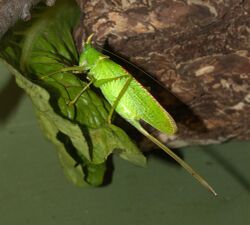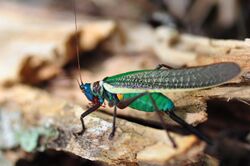Biology:Copiphorini
| Copiphorini | |
|---|---|

| |

| |
| Copiphora rhinoceros above, Moncheca pretiosa below (both females) | |
| Scientific classification | |
| Kingdom: | Animalia |
| Phylum: | Arthropoda |
| Class: | Insecta |
| Order: | Orthoptera |
| Suborder: | Ensifera |
| Family: | Tettigoniidae |
| Subfamily: | Conocephalinae |
| Tribe: | Copiphorini Karny 1912 |
The Copiphorini are a tribe of bush crickets or katydids in the family Tettigoniidae. Previously considered a subfamily (the Copiphorinae), they are now placed in the subfamily Conocephalinae.[1] Like some other members of Conocephalinae, they are known as coneheads, grasshopper-like insects with an extended, cone-shaped projection on their heads that juts forward in front of the base of the antennae.[2]
Description
Species in the tribe Copiphorini vary in length from about 24 to 74 mm (1 to 3 in). In most species, the female is considerably larger than the male, and in some, the largest male is smaller than the smallest female.[2] Like other members of the cricket suborder Ensifera, they differ from grasshoppers (suborder Caelifera) in having filamentous antennae that are longer than their bodies. Most species have loud songs which enable them to be identified. The call is made in most instances by the two fore wings rubbing together. Some species can hear with the aid of hearing organs in the tibia segments of their legs. The ovipositor is straight and slender and bears no teeth.[3]
Genera

Genera include:[4]
- Acantheremus Karny, 1907
- Anacaona Yong, 2019
- Apoecides Bolívar, 1914
- Artiotonus Montealegre-Z., Morris, Sarria-S. & Mason, 2011
- Banza Walker, 1870
- Belocephalus Scudder, 1875
- Borinquenula Walker & Gurney, 1972
- Brachycaulopsis Fontana, Mariño-Pérez & Woller, 2013
- Bucrates Burmeister, 1838
- Caetitus Antunes, Chamorro-Rengifo & Takiya, 2018
- Caulopsis Redtenbacher, 1891
- Clasma Karsch, 1893
- Conocephaloides Perkins, 1899
- Copiphora Serville, 1831
- Coryphodes Redtenbacher, 1891
- Daedalellus Uvarov, 1940
- Dorycoryphus Redtenbacher, 1891
- Erioloides Hebard, 1927
- Eriolus Bolívar, 1888
- Eucaulopsis Hebard, 1931
- Euconocephalus Karny, 1907
- Eurymetopa Redtenbacher, 1891
- Gryporhynchium Uvarov, 1940
- Lamniceps Bolívar, 1903
- Lanista Bolívar, 1890
- Lanistoides Sjöstedt, 1913
- Liostethus Redtenbacher, 1891
- Lirometopum Scudder, 1875
- Loboscelis Redtenbacher, 1891
- Mayacephalus Cadena-Castañeda, Monzón-Sierra & Cortés-Torres, 2016
- Melanophoxus Karny, 1907
- Metacaputus Naskrecki, 2000
- Moncheca Walker, 1869
- Montesa Walker, 1869
- Mygalopsis Redtenbacher, 1891
- Neoconocephalus Karny, 1907
- Oxyprora Stål, 1873
- Panacanthus Walker, 1869
- Parabucrates Scudder, 1897
- Paroxyprora Karny, 1907
- Parvarhynchus Farooqi & Usmani, 2020
- Pedinostethus Redtenbacher, 1891
- Phaneracra Uvarov, 1936
- Phoxacris Karny, 1907
- Plastocorypha Karsch, 1896
- Pluviasilva Naskrecki, 2000
- Poascirtus Saussure, 1899
- Podacanthophorus Naskrecki, 2000
- Pseudorhynchus Serville, 1838
- Pyrgocorypha Stål, 1873
- Rombophora Yong, 2019
- Ruspolia Schulthess, 1898
- Santandera Koçak & Kemal, 2008
- Sphodrophoxus Hebard, 1924
- Toledopizia Chamorro-Rengifo & Braun, 2010
- Unicorniella Yong, 2019
- Vestria Stål, 1874
- Xestophrys Redtenbacher, 1891
References
- ↑ Orthoptera species file (retrieved 3 January 2018)
- ↑ 2.0 2.1 Walker, Thomas J.. "Subfamily Copiphorinae". Singing Insects of North America. http://entnemdept.ifas.ufl.edu/walker/buzz/s160a.htm. Retrieved 2014-07-24.
- ↑ Walker, Thomas J.. "How to recognize crickets, katydids, and cicadas". Singing Insects of North America. http://entnemdept.ifas.ufl.edu/walker/buzz/i00dis.htm. Retrieved 2014-07-24.
- ↑ "subfamily Conocephalinae Burmeister, 1838". OSF Online. http://orthoptera.speciesfile.org/Common/basic/Taxa.aspx?TaxonNameID=1132630. Retrieved 26 April 2022.
Wikidata ☰ Q21215676 entry
 |
